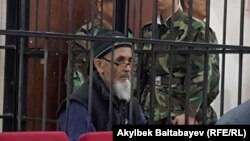A court in Kyrgyzstan upheld a life sentence on Tuesday for a prominent dissident accused of "inciting inter-ethnic hatred" in the former Soviet republic, defying U.N. calls for his release.
Azimjon Askarov, a 65-year-old ethnic Uzbek, was convicted of "organizing mass disturbances" and stirring up ethnic hatred leading to the killing of a policeman during clashes in southern Kyrgyzstan in June 2010, when more than 400 people were killed.
Reacting to the ruling, U.N. human rights chief Zeid Ra'ad al Hussein said the verdict was deeply troubling and said it was "truly unfortunate" the trial had not considered allegations that Askarov had been tortured.
The U.N. Human Rights Committee has also said Askarov had been arbitrarily detained, held in inhumane conditions and prevented from adequately preparing his defense.
His imprisonment sparked a political spat with the United States in 2015. Kyrgyz President Almazbek Atambayev accused Washington of seeking to "create chaos" in his country by granting Askarov an award and terminated a cooperation accord.
"Despite the repeated commitment of the Kyrgyz authorities to uphold international fair trial standards and to resolutely investigate torture allegations, this trial vividly displayed the deficiencies in the country's judicial and law enforcement system," Zeid said.
The trial was conducted in Kyrgyz, but Askarov is a native Uzbek speaker and the court-appointed interpreter was frequently absent, putting him at a disadvantage, the U.N. statement said.
Kyrgyzstan has come under fire for its poor human rights record despite holding a seat on the U.N. Human Rights Council.
According to Human Rights Watch, ill-treatment and torture of detainees are widespread, as are violence and discrimination against women and the country's LGBT community.
Following calls from the U.N. Human Rights Committee, Kyrgyzstan's Supreme Court sent Askarov's case to a regional court for review in July last year, ruling that he had been tortured and denied the right to mount a proper defence in his original trial.
The Chui Regional Court upheld his sentence on Tuesday.
Throughout the hearing, Askarov protested his innocence from the metal cage where he was held, saying he would appeal to an international court to investigate the 2010 clashes and challenge the verdict in a hunger strike.
Valery Vakhitov, Askarov's lawyer, said he would appeal the decision at the Supreme Court.






